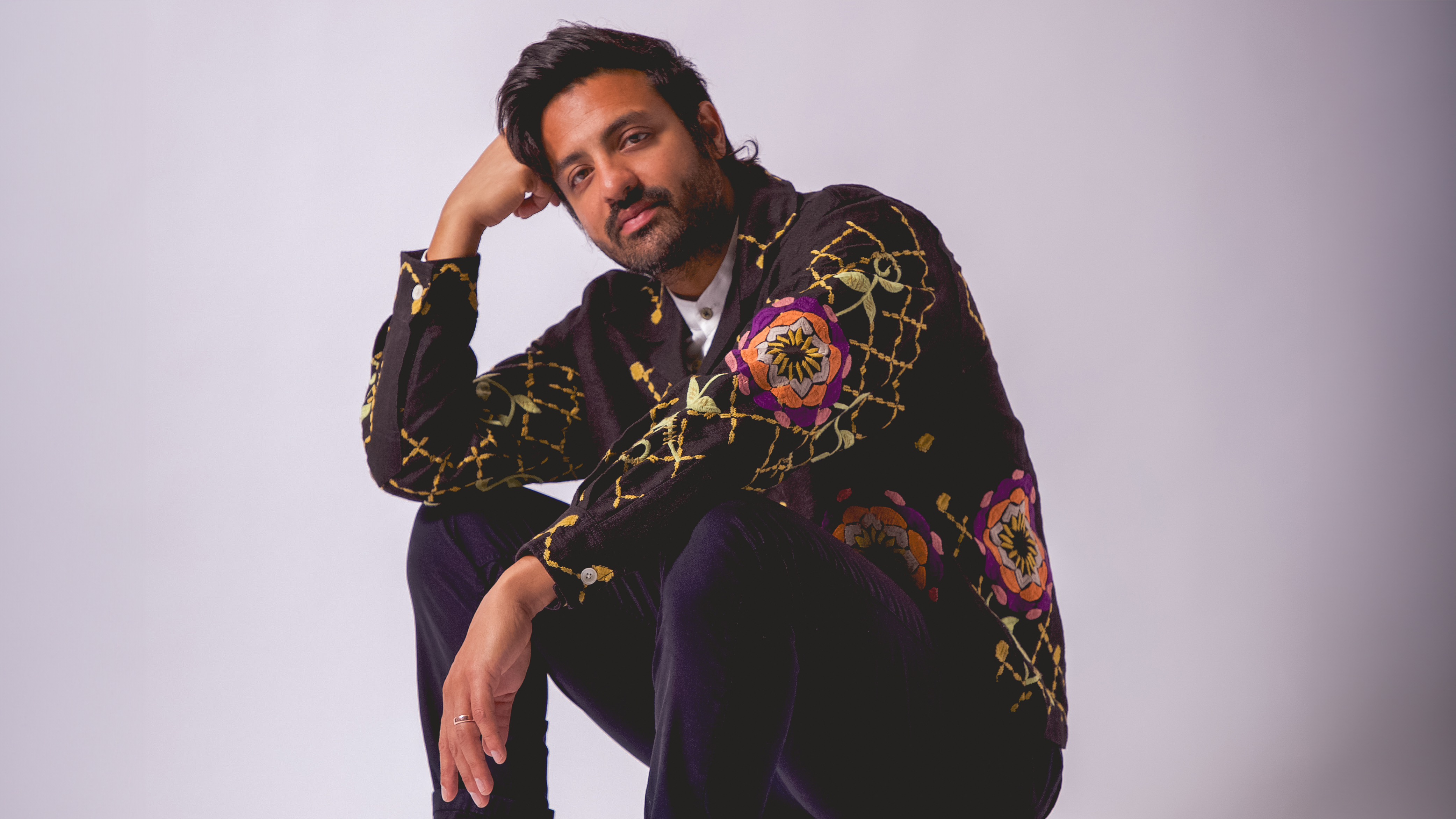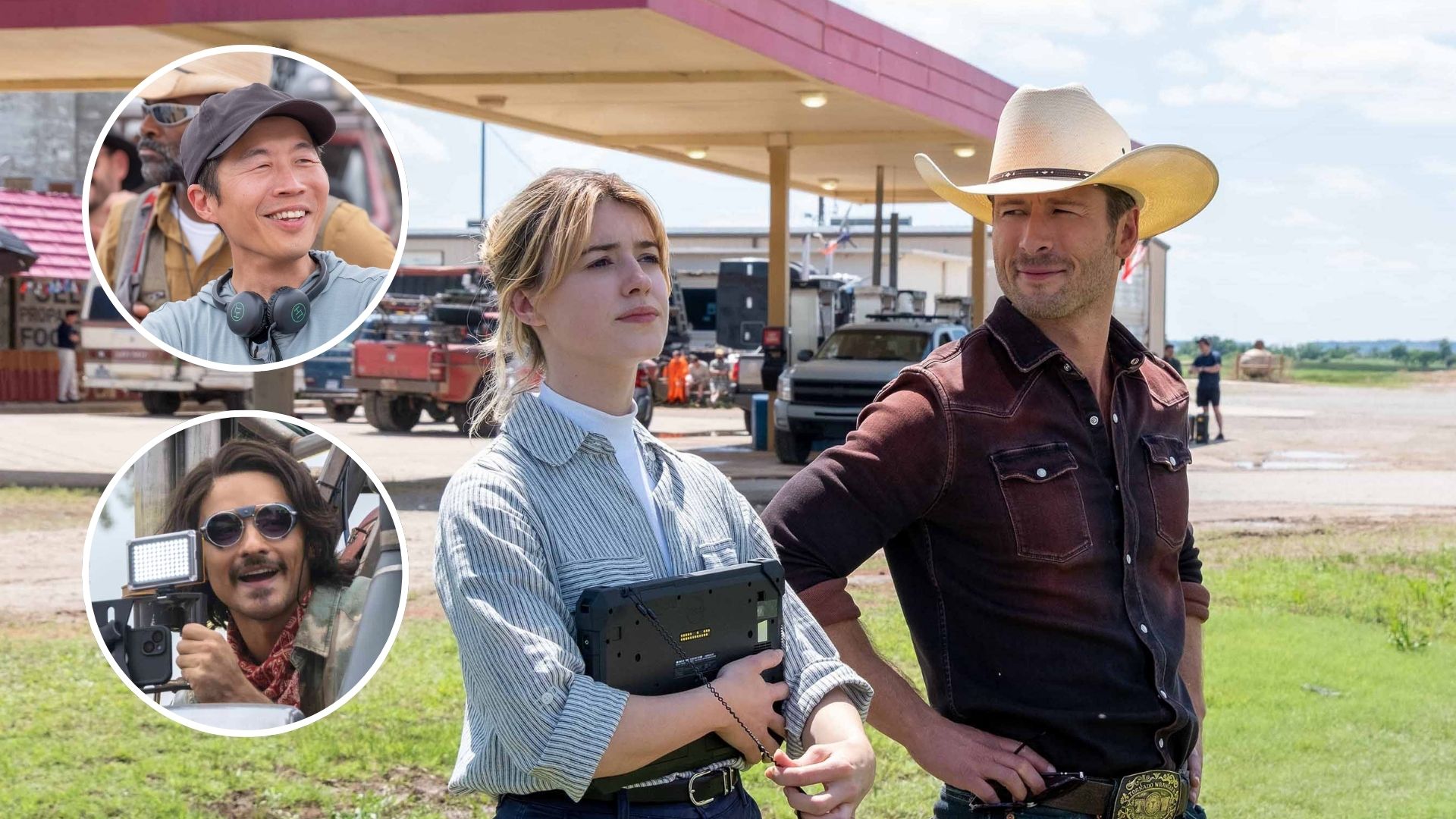
The first thing that catches the eye as Sameer Gadhia emerges from the dressing room is his clothes: He’s fitted in a green button-down and then a shirt jacket, both embellished in colorful floral embroidery. Employing Indian-inspired designs on Western pieces, the outfits he dons for our photoshoot echo not only the theme of his band’s most recent album, “American Bollywood,” but also his very existence — merging the two cultures of his Indian and American identity into one.
Gadhia is the frontman of Young the Giant, an alternative rock band from Irvine, California, that made their mark in the early 2010s with hits like “My Body,” “Cough Syrup” and “Mind over Matter.” He was born to Indian immigrants trying their hand at the American Dream and, like many first-generation kids, never saw music as a viable career path despite the art form being a multi-generational passion: His paternal grandmother was a budding Bollywood singer who gave up her dream to start a family, while his father played (but hesitated to pursue) Indian Classical music. Although Gadhia picked up playing instruments at an early age and started a band in high school (that would later become Young the Giant), he never allowed himself to take music too seriously.
“There weren’t many examples of [successful] brown singers, particularly in rock bands,” he says. “I didn’t really think it was a path for me.”



So Gadhia went to Stanford University, studying human biology and fiction writing — all the while working on an EP with the band. Then, as Young the Giant started to gain interest from record labels, he put a pause on school and signed with Roadrunner Records in 2009. Of course, giving up an education to pursue music was met with pushback from Gadhia’s family; but, the vocalist always had his grandmother in his corner, supporting his endeavor to fulfill their shared dream.
As Young the Giant’s prominence grew, Gadhia became more aware of his position as a person of color in a predominantly white genre. While he doesn’t go into specifics, he shares how isolating those years were. “I felt like I was being gaslit in a lot of ways,” he says of trying to find community with his white peers. Thus, Gadhia set off to create a space for musicians of color to discuss their experiences in the industry.
Enter: “Point of Origin.”
Originally on SiriusXM’s Alt Nation and Pandora as a radio segment, “Point of Origin” spotlights artists of color changing the game of alternative music, including guests like beabadoobee, KennyHoopla and Su Lee, by guaranteeing radio spins and a platform to share their stories. Earlier this year, the show relaunched as SiriusXM’s newest podcast — a format that, given its longer runtime, better fits Gadhia’s aspirations of having deeper dialogues with these artists. “I wanted to be able to share amazing music that’s being made by different people and tell different stories,” Gadhia says. “That has been a huge thing in trying to create a community.”
The show’s other goal is to challenge the belief of the genre’s homogeny. Many in the music industry have criticized the apparent whiteness of the indie and alt scenes. Journalist Noah Berlatsky writes in The New Republic that the industry has discredited many artists of color who fit the bill of the genre by classifying them as something else; he points to performers FKA Twigs and SZA as examples, both of whom are popularly categorized as R&B but whose sounds arguably teeter towards the peerage of alt/indie icon Björk. In this way, “white skin becomes the genre marker, rather than the music itself,” Berlatsky writes. These misconceptions are so pervasive that they even make their way to “Point of Origin”’s audience at times, as Gadhia explains, “I get hate all the time that I’m not playing alternative music [because I play artists of color]. [But] like, this is literally the genre.”

To his point, even Young the Giant’s sound has evolved past the rigid ideals of indie rock, leaning more into funk and psychedelic influences. Their latest album imbues instrumentation and lyricism from Gadhia’s South Asian heritage; it’s something he refuses to shy away from, not only honoring his background but also introducing those musical motifs to a broader audience. “It wasn’t trying to pimp [my] culture; it was trying to show the influence of South Asian diasporic music on popular music — in alternative, in indie, in pop and hip-hop,” he says.
“I wanted to refocus the lens and [show] where it comes from. It was an appreciation of the sounds throughout the genres, throughout the decades.”
But when discussing representation, Gadhia understands the tightrope he must walk to spotlight these unique perspectives, as diversity has unfortunately become commodified. “There are still these white executives who want to be a part of this ‘trendy’ thing, [but] I don’t want to dilute the artists who make this music,” he says. “I want to be able to talk about our experiences together and show them that I’m also in this with them.”


As someone who’s been in the industry since 2009, Gadhia sees so many new artists doing incredible things. He notes how we’re entering a post-genre society, where musicians are constantly pushing boundaries. Alternative artists are dominating streaming apps, music charts and award shows, making the genre more prevalent in the mainstream. Even traditional pop stars are employing songwriters from the alt scene, with Gadhia citing The National’s Aaron Dessner becoming a frequent collaborator of Taylor Swift, and Dua Lipa tapping Tame Impala’s Kevin Parker for her latest record.
With genres melding into what Gadhia considers a “universal language of music,” there’s no telling where his artistry will traverse next. This summer, on top of touring with Cage the Elephant and Bakar, Gadhia’s working on a new Young the Giant record and personal projects, including more episodes of “Point of Origin,” a solo album and a television series loosely based on his life as a “semi-famous” musician (think “Atlanta” or “Dave”) with Randall Park producing.
What Gadhia does now is beyond traditional, but there’s no love lost on his origins. In fact, he embraces and weaves them into everything he does.
This article will appear in Character Media’s Annual 2024 Issue. Read our 2023 issue here.
Watch Sameer Gadhia’s official “Milestone Mixtape” below, or listen to the playlist on Spotify.






